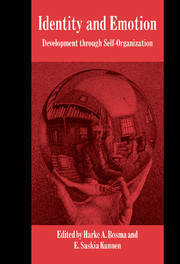Book contents
- Frontmatter
- Contents
- List of contributors
- Preface
- 1 Introduction
- 2 Developments in self-concept theory and research: affect, context, and variability
- Commentary: the self-concept is dead, long live … which construct or process? Differentiation and organization of self-related theories
- 3 The self and emotions
- Commentary: the self and emotions
- 4 Fish, foxes, and talking in the classroom: introducing dynamic systems concepts and approaches
- Commentary: fish, foxes, identity, and emotion
- 5 A relational perspective on the development of self and emotion
- Commentary: the personal experience of coherence
- 6 Affective processes in a multivoiced self
- Commentary: affective processes in a multivoiced self in action
- 7 Old–new answers and new-old questions for personality and emotion: a matter of complexity
- Commentary: emotions as sources of information about the self
- 8 Cognitive–emotional self-organization in personality development and personal identity
- Commentary: two faces of identity
- 9 A self-organizational approach to identity and emotions: an overview and implications
- References
- Author index
- Subject index
- Titles in the series
2 - Developments in self-concept theory and research: affect, context, and variability
Published online by Cambridge University Press: 28 October 2009
- Frontmatter
- Contents
- List of contributors
- Preface
- 1 Introduction
- 2 Developments in self-concept theory and research: affect, context, and variability
- Commentary: the self-concept is dead, long live … which construct or process? Differentiation and organization of self-related theories
- 3 The self and emotions
- Commentary: the self and emotions
- 4 Fish, foxes, and talking in the classroom: introducing dynamic systems concepts and approaches
- Commentary: fish, foxes, identity, and emotion
- 5 A relational perspective on the development of self and emotion
- Commentary: the personal experience of coherence
- 6 Affective processes in a multivoiced self
- Commentary: affective processes in a multivoiced self in action
- 7 Old–new answers and new-old questions for personality and emotion: a matter of complexity
- Commentary: emotions as sources of information about the self
- 8 Cognitive–emotional self-organization in personality development and personal identity
- Commentary: two faces of identity
- 9 A self-organizational approach to identity and emotions: an overview and implications
- References
- Author index
- Subject index
- Titles in the series
Summary
Theory and research on constructs such as the self-concept, which have a considerable history in psychology, are inevitably influenced by prevailing scientific opinions and developments at a particular point in time (Baumeister, 1987; Logan, 1987). In the sixties and seventies the self-concept was a rather unproblematic construct, predominantly handled as a trait: a relatively stable, generalized, cognitive set or system of descriptive features, characteristic of a particular individual. The majority of methods still used to investigate the self-concept, mainly variations of self-esteem questionnaires, underline this view (Byrne, 1996; Wylie, 1989).
This solid picture has, however, been questioned during the last two decades from different angles. Markus and Wurf's (1987) proposal for a dynamic self-concept, in which situational influences are taken into account, has been very influential in this process. Not surprisingly, the focusing on situational aspects of the self-concept undermines its supposed stability. Furthermore, the strictly cognitivistic interpretation of the self-concept has been differentiated (Byrne, 1996; Damon and Hart, 1988; Greenwald and Pratkanis, 1984), most explicitly by Epstein (1993a).
In this chapter the attention is focused on the foregoing three issues. The traditional conceptualization of the self-concept will be examined in the light of recent developments: (a) the cognitive view of the self-concept will be confronted with the role of emotion, (b) the idea of a generalized construct faces the problem of how to take the context into account, and (c) the assumed stability of the self-concept has to stand up against observed situational and temporal variability of the self-concept.
- Type
- Chapter
- Information
- Identity and EmotionDevelopment through Self-Organization, pp. 10 - 32Publisher: Cambridge University PressPrint publication year: 2001
- 2
- Cited by

